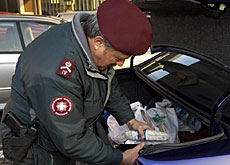Parliament endorses closer ties with EU

The Swiss parliament has approved a controversial treaty on closer security cooperation with the European Union.
As expected, the House of Representatives followed the Senate’s lead in endorsing the Schengen/Dublin accord, which also covers asylum.
The treaty was one of six accords approved on Wednesday. They form part of a second set of bilateral agreements with the EU.
The House of Representatives approved two other accords – the fight against customs fraud and the introduction of a withholding tax on income from EU residents’ savings in Swiss banks – on Thursday.
In line with government recommendations, the house decided against holding an obligatory referendum on the Schengen/Dublin agreement.
The decision means that opponents, including the rightwing Swiss People’s Party, will have to collect 50,000 signatures to force a nationwide vote. This is likely to take place next year.
The People’s Party and small far-right groups have repeatedly said they would challenge parliament’s decision.
Heated debates
During three days of heated debate in the House of Representatives, members of the People’s Party warned that the accords undermined Switzerland’s sovereignty.
They said the government was using Schengen/Dublin to enter the EU through the back door.
They also claimed it would lead to an influx of foreign criminals in Switzerland.
However, Economics Minister Joseph Deiss, who is also this year’s Swiss president, said the agreements would further improve relations with the EU, Switzerland’s main trading partner.
He denounced the People’s Party for scaremongering and spreading false allegations.
Foreign Minister Micheline Calmy-Rey said the accords would contribute to the country’s security, adding that they were in the interests of the business community.
Supporters from the other three main parties argued that Switzerland’s economy stood to benefit from Bilaterals II, which would allow it to keep its banking secrecy rules.
In 2000 the Swiss electorate approved a first set of seven bilateral treaties with the EU, mainly on trade, labour and transport.
swissinfo with agencies
The purpose of the Schengen agreement is to enable people to move freely between the countries that are party to it. They include all 15 old EU member states, Norway and Iceland. Britain and the Irish Republic have opted out. Signatory nations have access to a databank on wanted or missing people and objects.
The Dublin convention defines the state responsible for examining asylum requests. Requests can only be lodged in one member state. Switzerland is virtually the only country in western Europe which is not party to the agreement.
The Bilaterals II cover:
Security and asylum cooperation
Taxation of savings, tax evasion
Customs fraud, smuggling
Processed agricultural products
Environment
Media, film production, distribution, training
Statistics
Pensions
Education, vocational training

In compliance with the JTI standards
More: SWI swissinfo.ch certified by the Journalism Trust Initiative












You can find an overview of ongoing debates with our journalists here . Please join us!
If you want to start a conversation about a topic raised in this article or want to report factual errors, email us at english@swissinfo.ch.